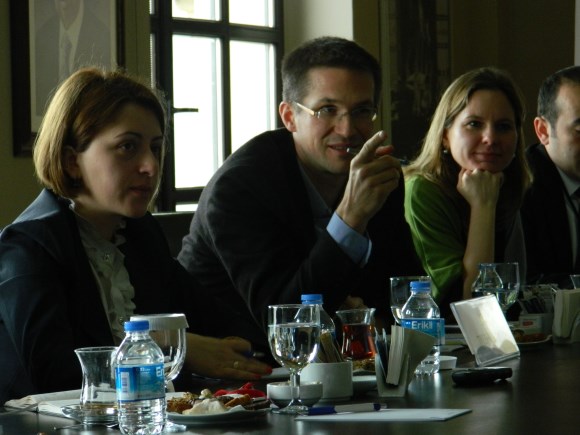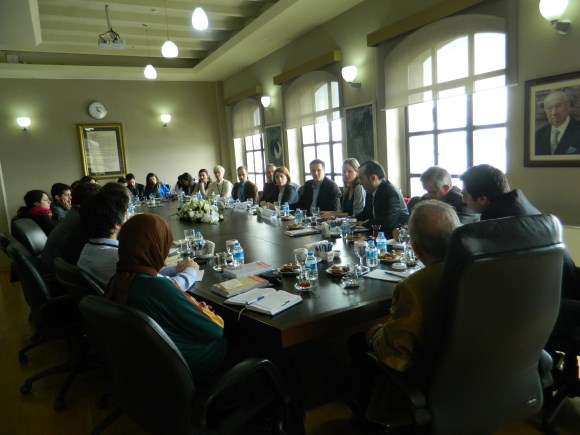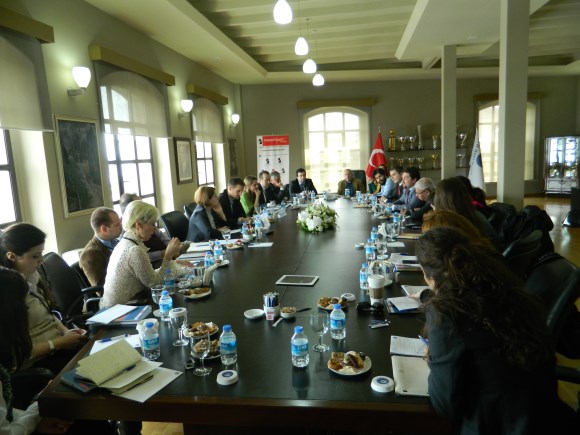|
TPQ - ESI - Kadir Has University
Roundtable Discussion
25 March 2013, Istanbul
On 25 March 2013, Turkish Policy Quarterly (TPQ), the European Stability Initiative (ESI), and Kadir Has University International Relations Department held a roundtable event entitled The Prospects for Stability and Instability in the Caucasus in 2013 - A View From Georgia. Former Foreign Minister of Georgia, Eka Tkeshelashvili, featured as the keynote speaker.

In his opening remarks as moderator, Gerald Knaus, Chairman of ESI, set the stage for Ms. Tkeshelashvili's speech. Mr. Knaus remarked that: "Georgia has stood out and caught attention in recent years, not only in the region but in Europe. Last year it caught attention again with a democratic change in power following free and fair elections." The elections in Georgia in October 2012 constitute a precedent for the region as they led to the first transfer of power in the post-Soviet region not preceded by a revolution aside from the Baltic countries. As a result of this, Georgia now has both a new government and a strong opposition, pluralism "not only in parliament, but also in civil society."
Taking the floor, Tkeshelashvili, speaking as president of a newly established think tank in Tbilisi, the Georgian Institute for Strategic Studies, outlined the reforms Georgia underwent in the past decade to shed post-Soviet legacies. She touched upon progress marked in areas such as fighting organized crime, easing regulations for doing business, targeting systemic corruption, and setting up a service-oriented bureaucracy.

Pointing out some of the domestic challenges and risks today in Georgia, the former Minister explained that Bidzina Ivanishvili is not only the Prime Minister, but also Georgia's richest person. This, she suggested, raises questions and creates the risk of dependence on the funds of the political leader.
Speaking about maintaining course on the path of democracy, Tkeshelashvili explained the following trends as decisive: whether the Georgian judiciary can maintain and strengthen its independence, pluralism in the media, the expectation of freedom and good governance by the Georgian people, and a strong opposition. She reflected her perspective of the mindset of the opposition with the following words: "The ruling coalition gained power in normal elections, not a revolution. But they are in a revolutionary mindset. So far the government has spent a lot of time on containing the President. Recently legal amendments were also made to curb presidential power. Now the coalition should focus more attention on policy issues."
Tkeshelashvili highlighted the Georgian nation's will to become part of the Euro-Atlantic community, as well as the importance of having a strong and solid relationship with Turkey, stating that: "We are a cheerleader for Turkey's EU path. It is good for Europe, and it is good for Georgia." Even though Georgian-Turkish official relations are very good, Tkeshelashvili remarked that instead of taking these relations for granted "We need to diversify the relations, to include many different facets of society – journalists, professionals, academics and so on."

Commenting on a statement by Ivanishvili about the possible re-opening of the Russian railway (which passes through the region of Abkhazia), Tkeshelashvili noted that this would not be in Georgia's interests unless this is part of a larger deal. The reversal of recognitions (of Abkhazia and South Ossetia) and the return of Georgian refugees are two steps she noted as essential for Georgia to "give up its card" regarding the railway.
To re-integrate Abkhazia and South Ossetia, Russia is the key, she stated, and Moscow does not think it is in its interest for Georgia to go Westwards. Since we cannot change Russian minds at this point, we need to pretend we are not under occupation, and continue to develop economically and politically, she argued. Tbilisi should remain pragmatic and, rather than having unrealistic views on the possibility of resolving the conflict through direct talks with Abkhazians and Ossetians, as their position will not determine whether or not Russian troops leave the territory of Georgia. Georgia should continue to invest in people-to-people contacts, to ensure that when conditions are ripe for resolution, the people –both in Georgia and the breakaway regions– will not be an obstacle to resolution. Despite all the issues that the country is struggling with, "Georgia is stable within all the chaos in the Caucasus," Tkeshelashvili observed.
At the end of the presentation, a lively Q & A session followed. Many questions focused on Georgian-Russian relations and on the future of the breakaway regions of Georgia, while some were about the prospects of Georgia's new government.
|












